Advanced Care Planning in Australia: Ethical and Legal Considerations
VerifiedAdded on 2022/12/14
|6
|1451
|365
Essay
AI Summary
This essay delves into the critical aspects of Advanced Care Planning (ACP) within the Australian healthcare system, particularly focusing on its application in palliative care and end-of-life scenarios. The discussion encompasses the ethical principles that guide ACP, such as beneficence, non-maleficence, and informed consent, while also acknowledging the ethical dilemmas, especially regarding assisted suicide. The essay explores current research, community discussions, and the practical preparation and utilization of ACP, emphasizing the importance of patient autonomy and dignified end-of-life choices. Furthermore, it examines the relevant Victorian legal framework, notably the Voluntary Assisted Dying Act of 2017, which legalized assisted suicide under specific conditions. The analysis highlights the significance of ACP for the well-being of the aging population and those with chronic illnesses, underscoring the need for healthcare professionals to navigate complex ethical and legal considerations to ensure the best possible care.
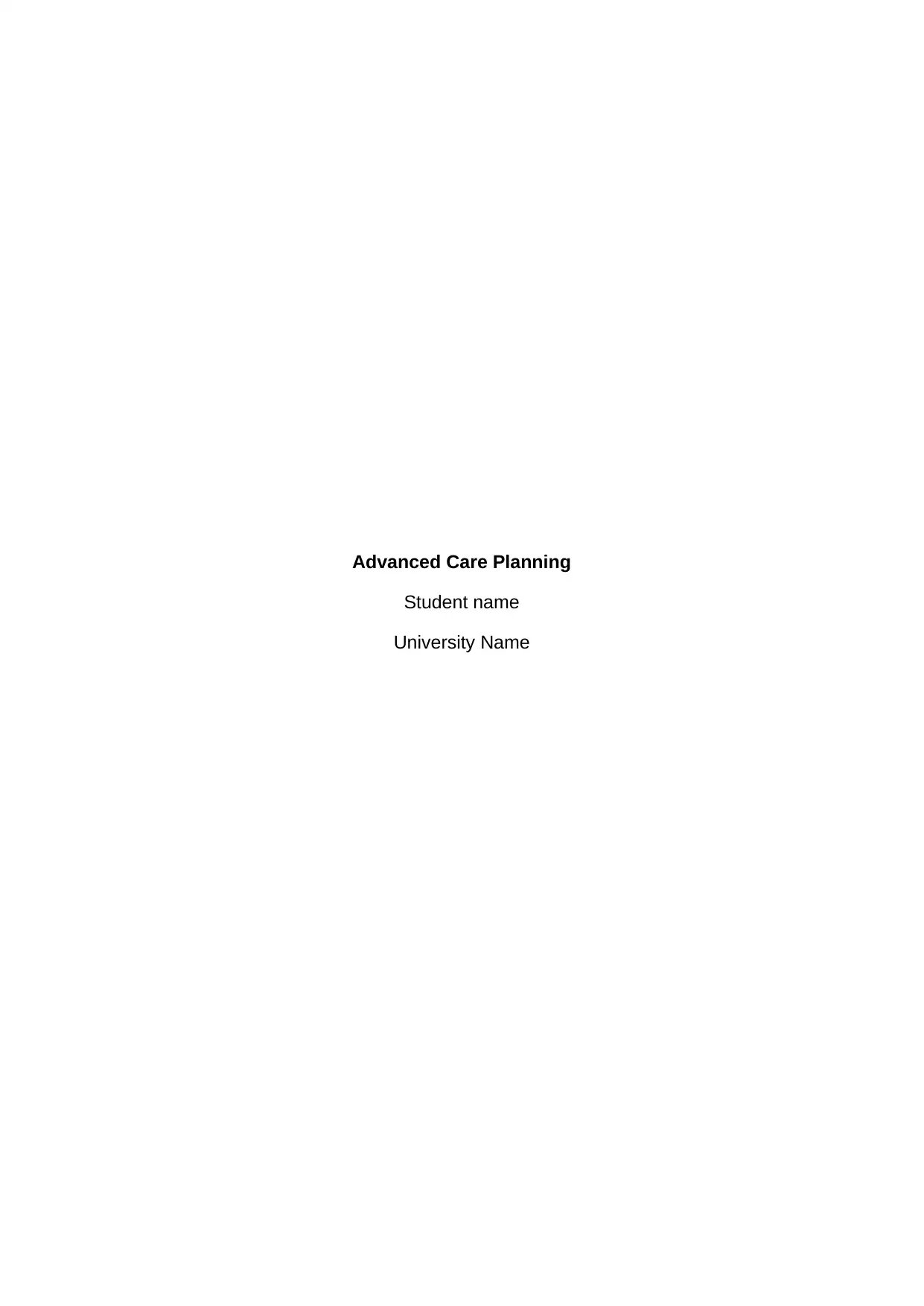
Advanced Care Planning
Student name
University Name
Student name
University Name
Paraphrase This Document
Need a fresh take? Get an instant paraphrase of this document with our AI Paraphraser
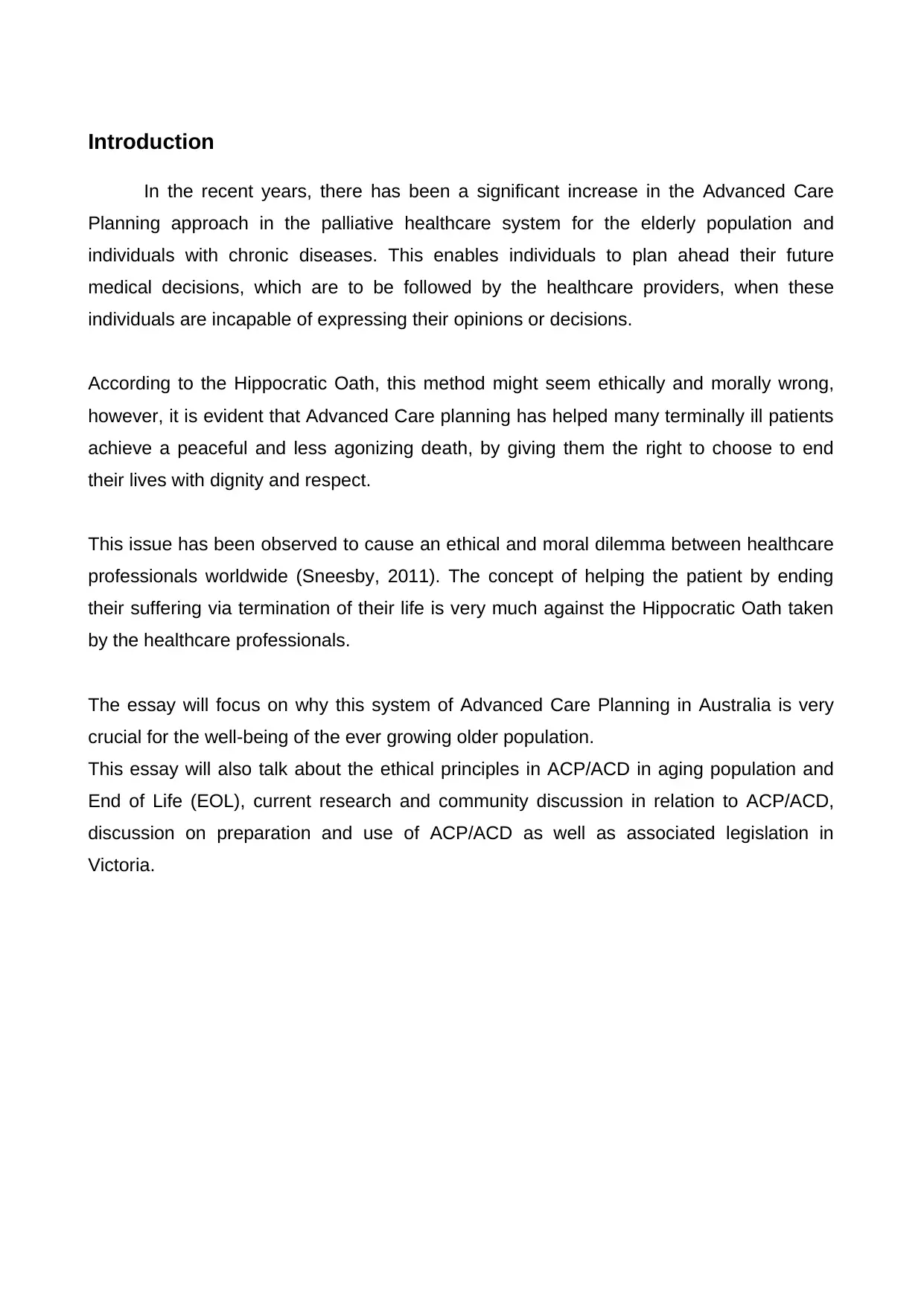
Introduction
In the recent years, there has been a significant increase in the Advanced Care
Planning approach in the palliative healthcare system for the elderly population and
individuals with chronic diseases. This enables individuals to plan ahead their future
medical decisions, which are to be followed by the healthcare providers, when these
individuals are incapable of expressing their opinions or decisions.
According to the Hippocratic Oath, this method might seem ethically and morally wrong,
however, it is evident that Advanced Care planning has helped many terminally ill patients
achieve a peaceful and less agonizing death, by giving them the right to choose to end
their lives with dignity and respect.
This issue has been observed to cause an ethical and moral dilemma between healthcare
professionals worldwide (Sneesby, 2011). The concept of helping the patient by ending
their suffering via termination of their life is very much against the Hippocratic Oath taken
by the healthcare professionals.
The essay will focus on why this system of Advanced Care Planning in Australia is very
crucial for the well-being of the ever growing older population.
This essay will also talk about the ethical principles in ACP/ACD in aging population and
End of Life (EOL), current research and community discussion in relation to ACP/ACD,
discussion on preparation and use of ACP/ACD as well as associated legislation in
Victoria.
In the recent years, there has been a significant increase in the Advanced Care
Planning approach in the palliative healthcare system for the elderly population and
individuals with chronic diseases. This enables individuals to plan ahead their future
medical decisions, which are to be followed by the healthcare providers, when these
individuals are incapable of expressing their opinions or decisions.
According to the Hippocratic Oath, this method might seem ethically and morally wrong,
however, it is evident that Advanced Care planning has helped many terminally ill patients
achieve a peaceful and less agonizing death, by giving them the right to choose to end
their lives with dignity and respect.
This issue has been observed to cause an ethical and moral dilemma between healthcare
professionals worldwide (Sneesby, 2011). The concept of helping the patient by ending
their suffering via termination of their life is very much against the Hippocratic Oath taken
by the healthcare professionals.
The essay will focus on why this system of Advanced Care Planning in Australia is very
crucial for the well-being of the ever growing older population.
This essay will also talk about the ethical principles in ACP/ACD in aging population and
End of Life (EOL), current research and community discussion in relation to ACP/ACD,
discussion on preparation and use of ACP/ACD as well as associated legislation in
Victoria.
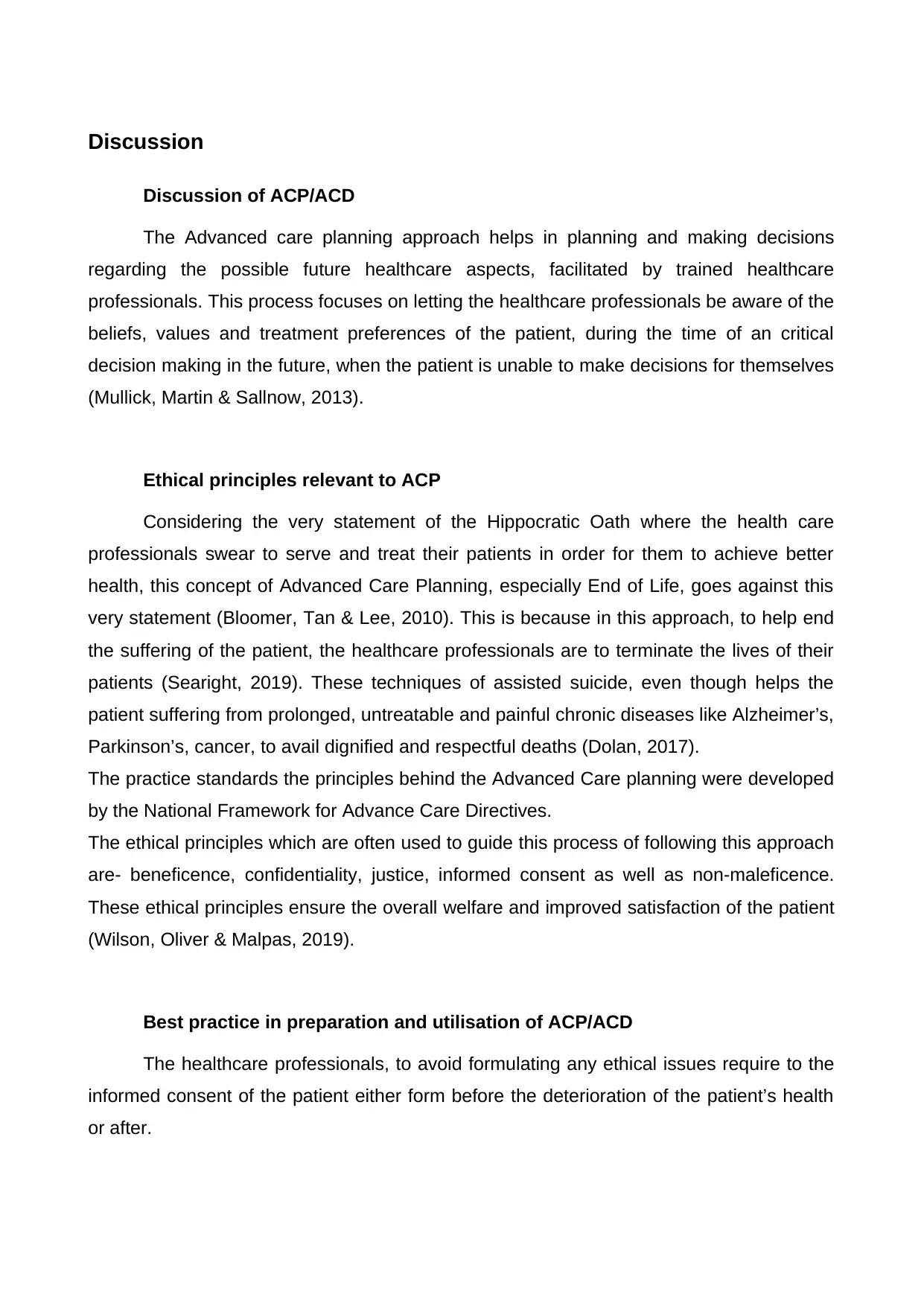
Discussion
Discussion of ACP/ACD
The Advanced care planning approach helps in planning and making decisions
regarding the possible future healthcare aspects, facilitated by trained healthcare
professionals. This process focuses on letting the healthcare professionals be aware of the
beliefs, values and treatment preferences of the patient, during the time of an critical
decision making in the future, when the patient is unable to make decisions for themselves
(Mullick, Martin & Sallnow, 2013).
Ethical principles relevant to ACP
Considering the very statement of the Hippocratic Oath where the health care
professionals swear to serve and treat their patients in order for them to achieve better
health, this concept of Advanced Care Planning, especially End of Life, goes against this
very statement (Bloomer, Tan & Lee, 2010). This is because in this approach, to help end
the suffering of the patient, the healthcare professionals are to terminate the lives of their
patients (Searight, 2019). These techniques of assisted suicide, even though helps the
patient suffering from prolonged, untreatable and painful chronic diseases like Alzheimer’s,
Parkinson’s, cancer, to avail dignified and respectful deaths (Dolan, 2017).
The practice standards the principles behind the Advanced Care planning were developed
by the National Framework for Advance Care Directives.
The ethical principles which are often used to guide this process of following this approach
are- beneficence, confidentiality, justice, informed consent as well as non-maleficence.
These ethical principles ensure the overall welfare and improved satisfaction of the patient
(Wilson, Oliver & Malpas, 2019).
Best practice in preparation and utilisation of ACP/ACD
The healthcare professionals, to avoid formulating any ethical issues require to the
informed consent of the patient either form before the deterioration of the patient’s health
or after.
Discussion of ACP/ACD
The Advanced care planning approach helps in planning and making decisions
regarding the possible future healthcare aspects, facilitated by trained healthcare
professionals. This process focuses on letting the healthcare professionals be aware of the
beliefs, values and treatment preferences of the patient, during the time of an critical
decision making in the future, when the patient is unable to make decisions for themselves
(Mullick, Martin & Sallnow, 2013).
Ethical principles relevant to ACP
Considering the very statement of the Hippocratic Oath where the health care
professionals swear to serve and treat their patients in order for them to achieve better
health, this concept of Advanced Care Planning, especially End of Life, goes against this
very statement (Bloomer, Tan & Lee, 2010). This is because in this approach, to help end
the suffering of the patient, the healthcare professionals are to terminate the lives of their
patients (Searight, 2019). These techniques of assisted suicide, even though helps the
patient suffering from prolonged, untreatable and painful chronic diseases like Alzheimer’s,
Parkinson’s, cancer, to avail dignified and respectful deaths (Dolan, 2017).
The practice standards the principles behind the Advanced Care planning were developed
by the National Framework for Advance Care Directives.
The ethical principles which are often used to guide this process of following this approach
are- beneficence, confidentiality, justice, informed consent as well as non-maleficence.
These ethical principles ensure the overall welfare and improved satisfaction of the patient
(Wilson, Oliver & Malpas, 2019).
Best practice in preparation and utilisation of ACP/ACD
The healthcare professionals, to avoid formulating any ethical issues require to the
informed consent of the patient either form before the deterioration of the patient’s health
or after.
⊘ This is a preview!⊘
Do you want full access?
Subscribe today to unlock all pages.

Trusted by 1+ million students worldwide
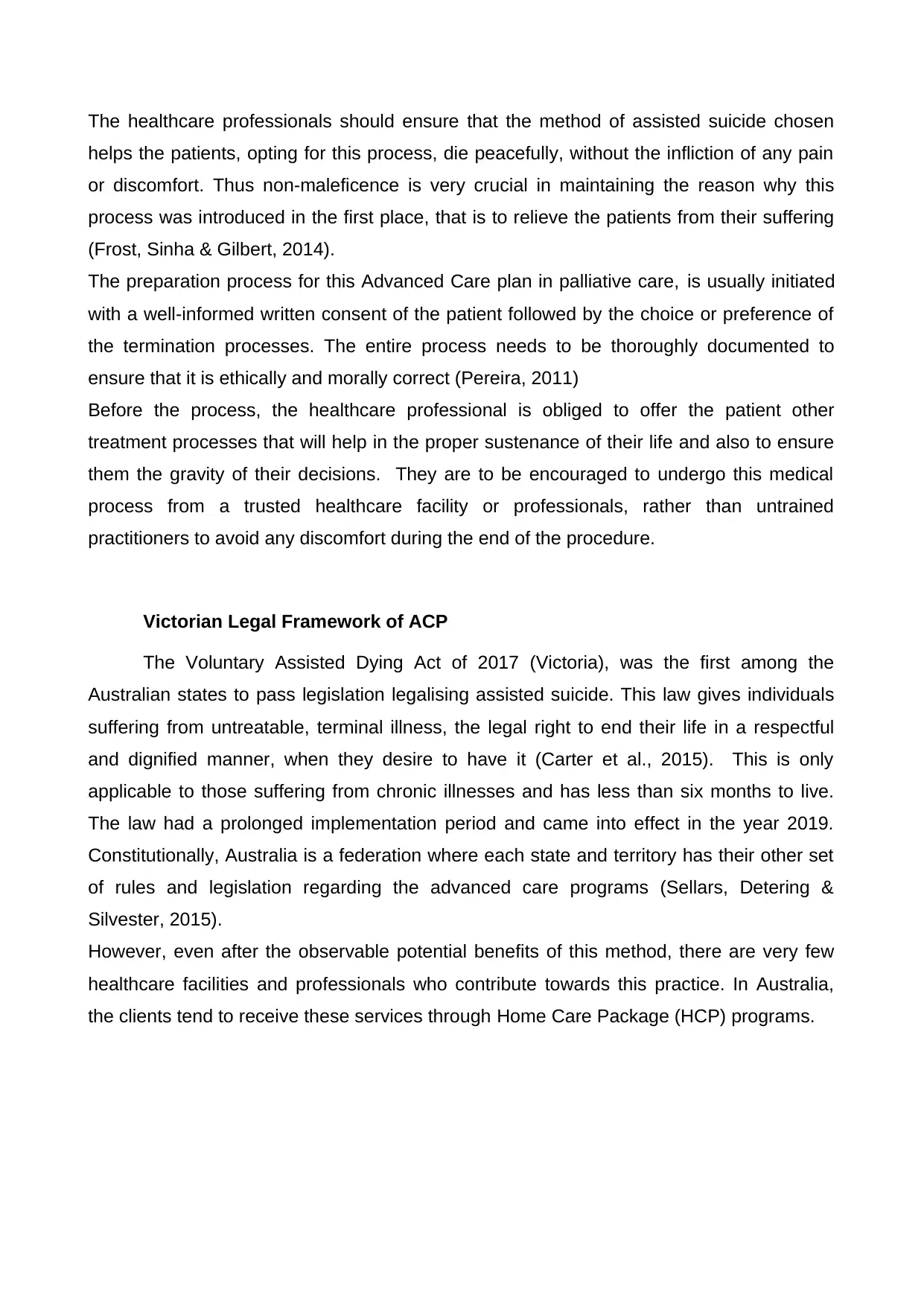
The healthcare professionals should ensure that the method of assisted suicide chosen
helps the patients, opting for this process, die peacefully, without the infliction of any pain
or discomfort. Thus non-maleficence is very crucial in maintaining the reason why this
process was introduced in the first place, that is to relieve the patients from their suffering
(Frost, Sinha & Gilbert, 2014).
The preparation process for this Advanced Care plan in palliative care, is usually initiated
with a well-informed written consent of the patient followed by the choice or preference of
the termination processes. The entire process needs to be thoroughly documented to
ensure that it is ethically and morally correct (Pereira, 2011)
Before the process, the healthcare professional is obliged to offer the patient other
treatment processes that will help in the proper sustenance of their life and also to ensure
them the gravity of their decisions. They are to be encouraged to undergo this medical
process from a trusted healthcare facility or professionals, rather than untrained
practitioners to avoid any discomfort during the end of the procedure.
Victorian Legal Framework of ACP
The Voluntary Assisted Dying Act of 2017 (Victoria), was the first among the
Australian states to pass legislation legalising assisted suicide. This law gives individuals
suffering from untreatable, terminal illness, the legal right to end their life in a respectful
and dignified manner, when they desire to have it (Carter et al., 2015). This is only
applicable to those suffering from chronic illnesses and has less than six months to live.
The law had a prolonged implementation period and came into effect in the year 2019.
Constitutionally, Australia is a federation where each state and territory has their other set
of rules and legislation regarding the advanced care programs (Sellars, Detering &
Silvester, 2015).
However, even after the observable potential benefits of this method, there are very few
healthcare facilities and professionals who contribute towards this practice. In Australia,
the clients tend to receive these services through Home Care Package (HCP) programs.
helps the patients, opting for this process, die peacefully, without the infliction of any pain
or discomfort. Thus non-maleficence is very crucial in maintaining the reason why this
process was introduced in the first place, that is to relieve the patients from their suffering
(Frost, Sinha & Gilbert, 2014).
The preparation process for this Advanced Care plan in palliative care, is usually initiated
with a well-informed written consent of the patient followed by the choice or preference of
the termination processes. The entire process needs to be thoroughly documented to
ensure that it is ethically and morally correct (Pereira, 2011)
Before the process, the healthcare professional is obliged to offer the patient other
treatment processes that will help in the proper sustenance of their life and also to ensure
them the gravity of their decisions. They are to be encouraged to undergo this medical
process from a trusted healthcare facility or professionals, rather than untrained
practitioners to avoid any discomfort during the end of the procedure.
Victorian Legal Framework of ACP
The Voluntary Assisted Dying Act of 2017 (Victoria), was the first among the
Australian states to pass legislation legalising assisted suicide. This law gives individuals
suffering from untreatable, terminal illness, the legal right to end their life in a respectful
and dignified manner, when they desire to have it (Carter et al., 2015). This is only
applicable to those suffering from chronic illnesses and has less than six months to live.
The law had a prolonged implementation period and came into effect in the year 2019.
Constitutionally, Australia is a federation where each state and territory has their other set
of rules and legislation regarding the advanced care programs (Sellars, Detering &
Silvester, 2015).
However, even after the observable potential benefits of this method, there are very few
healthcare facilities and professionals who contribute towards this practice. In Australia,
the clients tend to receive these services through Home Care Package (HCP) programs.
Paraphrase This Document
Need a fresh take? Get an instant paraphrase of this document with our AI Paraphraser
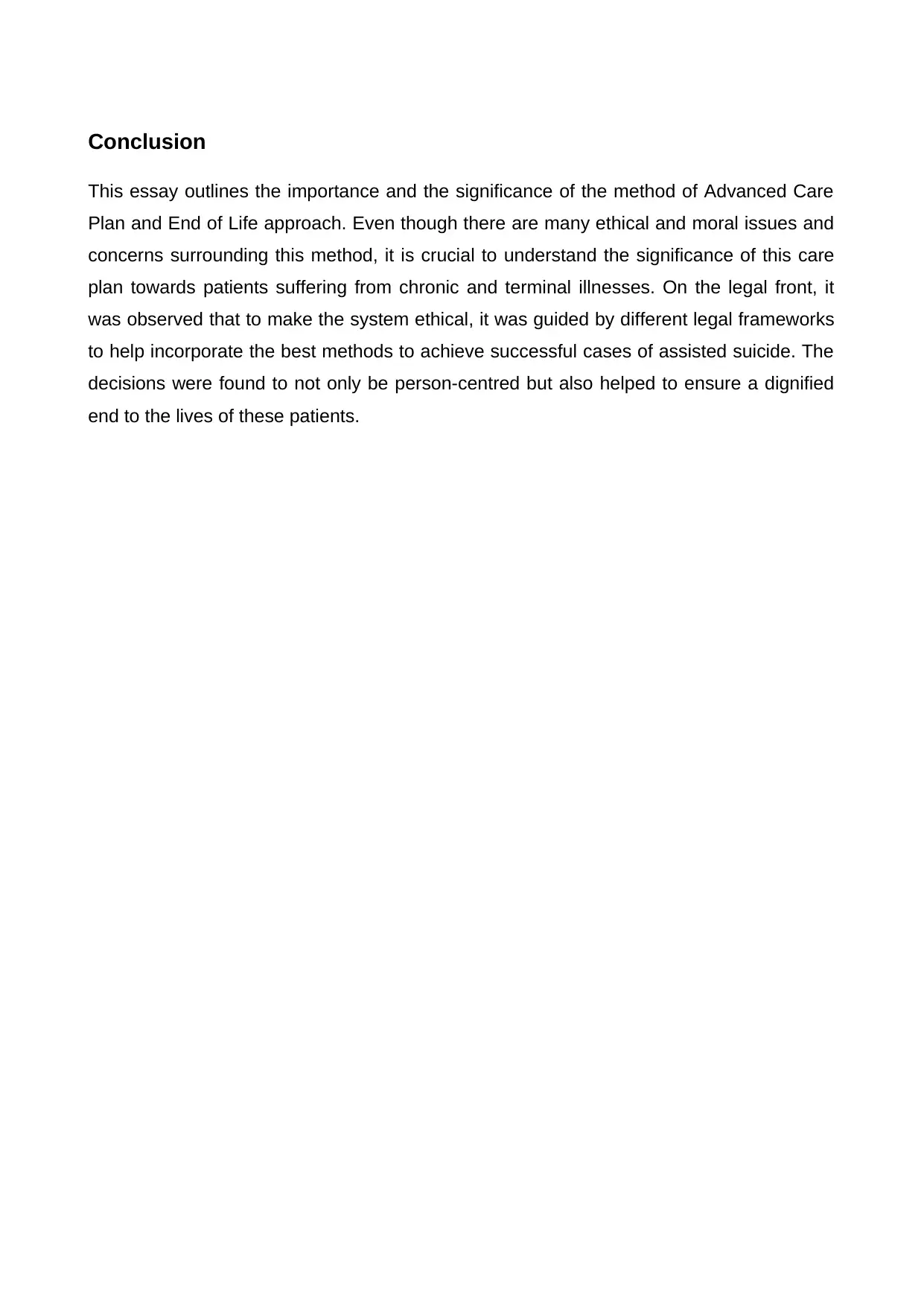
Conclusion
This essay outlines the importance and the significance of the method of Advanced Care
Plan and End of Life approach. Even though there are many ethical and moral issues and
concerns surrounding this method, it is crucial to understand the significance of this care
plan towards patients suffering from chronic and terminal illnesses. On the legal front, it
was observed that to make the system ethical, it was guided by different legal frameworks
to help incorporate the best methods to achieve successful cases of assisted suicide. The
decisions were found to not only be person-centred but also helped to ensure a dignified
end to the lives of these patients.
This essay outlines the importance and the significance of the method of Advanced Care
Plan and End of Life approach. Even though there are many ethical and moral issues and
concerns surrounding this method, it is crucial to understand the significance of this care
plan towards patients suffering from chronic and terminal illnesses. On the legal front, it
was observed that to make the system ethical, it was guided by different legal frameworks
to help incorporate the best methods to achieve successful cases of assisted suicide. The
decisions were found to not only be person-centred but also helped to ensure a dignified
end to the lives of these patients.
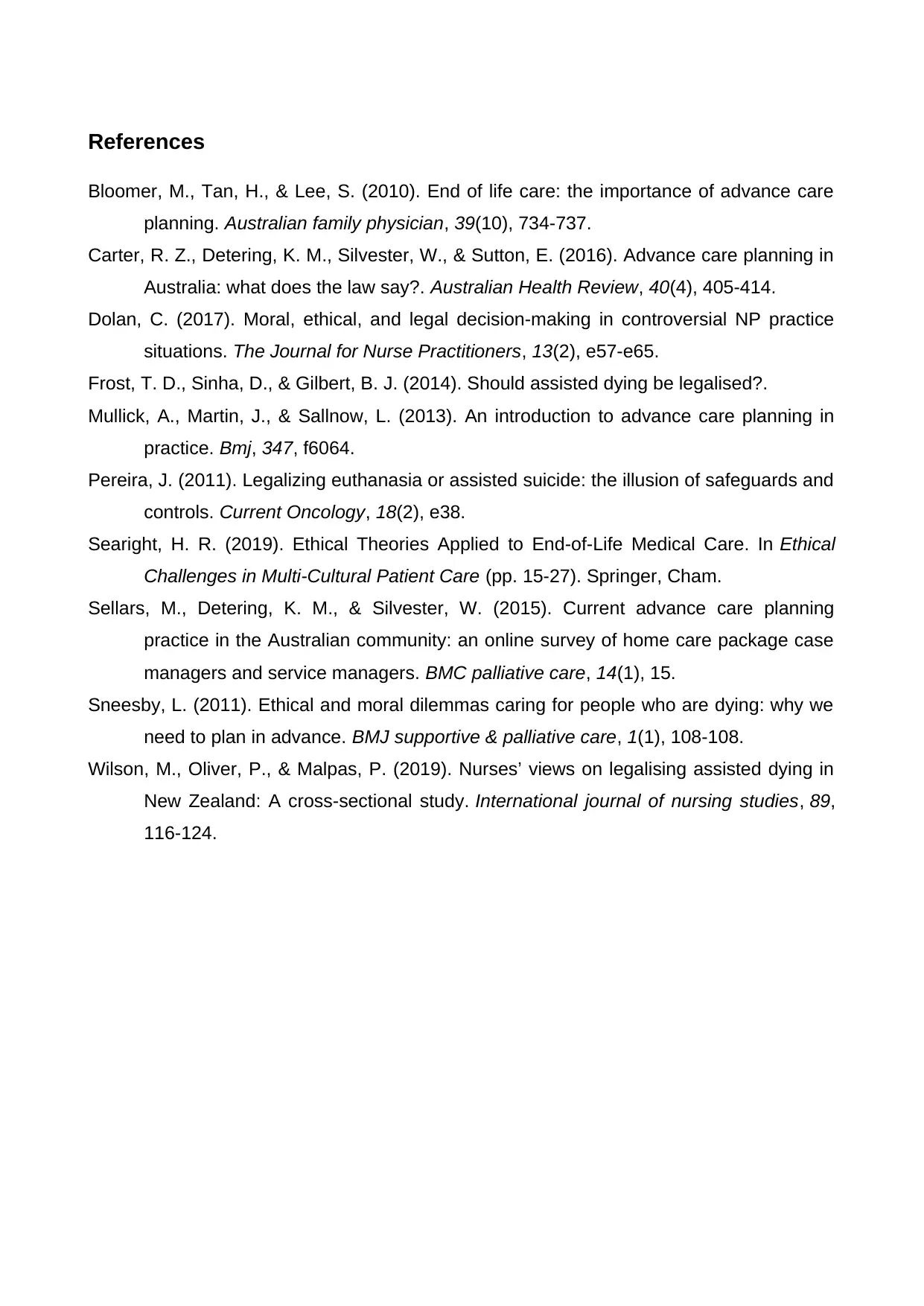
References
Bloomer, M., Tan, H., & Lee, S. (2010). End of life care: the importance of advance care
planning. Australian family physician, 39(10), 734-737.
Carter, R. Z., Detering, K. M., Silvester, W., & Sutton, E. (2016). Advance care planning in
Australia: what does the law say?. Australian Health Review, 40(4), 405-414.
Dolan, C. (2017). Moral, ethical, and legal decision-making in controversial NP practice
situations. The Journal for Nurse Practitioners, 13(2), e57-e65.
Frost, T. D., Sinha, D., & Gilbert, B. J. (2014). Should assisted dying be legalised?.
Mullick, A., Martin, J., & Sallnow, L. (2013). An introduction to advance care planning in
practice. Bmj, 347, f6064.
Pereira, J. (2011). Legalizing euthanasia or assisted suicide: the illusion of safeguards and
controls. Current Oncology, 18(2), e38.
Searight, H. R. (2019). Ethical Theories Applied to End-of-Life Medical Care. In Ethical
Challenges in Multi-Cultural Patient Care (pp. 15-27). Springer, Cham.
Sellars, M., Detering, K. M., & Silvester, W. (2015). Current advance care planning
practice in the Australian community: an online survey of home care package case
managers and service managers. BMC palliative care, 14(1), 15.
Sneesby, L. (2011). Ethical and moral dilemmas caring for people who are dying: why we
need to plan in advance. BMJ supportive & palliative care, 1(1), 108-108.
Wilson, M., Oliver, P., & Malpas, P. (2019). Nurses’ views on legalising assisted dying in
New Zealand: A cross-sectional study. International journal of nursing studies, 89,
116-124.
Bloomer, M., Tan, H., & Lee, S. (2010). End of life care: the importance of advance care
planning. Australian family physician, 39(10), 734-737.
Carter, R. Z., Detering, K. M., Silvester, W., & Sutton, E. (2016). Advance care planning in
Australia: what does the law say?. Australian Health Review, 40(4), 405-414.
Dolan, C. (2017). Moral, ethical, and legal decision-making in controversial NP practice
situations. The Journal for Nurse Practitioners, 13(2), e57-e65.
Frost, T. D., Sinha, D., & Gilbert, B. J. (2014). Should assisted dying be legalised?.
Mullick, A., Martin, J., & Sallnow, L. (2013). An introduction to advance care planning in
practice. Bmj, 347, f6064.
Pereira, J. (2011). Legalizing euthanasia or assisted suicide: the illusion of safeguards and
controls. Current Oncology, 18(2), e38.
Searight, H. R. (2019). Ethical Theories Applied to End-of-Life Medical Care. In Ethical
Challenges in Multi-Cultural Patient Care (pp. 15-27). Springer, Cham.
Sellars, M., Detering, K. M., & Silvester, W. (2015). Current advance care planning
practice in the Australian community: an online survey of home care package case
managers and service managers. BMC palliative care, 14(1), 15.
Sneesby, L. (2011). Ethical and moral dilemmas caring for people who are dying: why we
need to plan in advance. BMJ supportive & palliative care, 1(1), 108-108.
Wilson, M., Oliver, P., & Malpas, P. (2019). Nurses’ views on legalising assisted dying in
New Zealand: A cross-sectional study. International journal of nursing studies, 89,
116-124.
⊘ This is a preview!⊘
Do you want full access?
Subscribe today to unlock all pages.

Trusted by 1+ million students worldwide
1 out of 6
Related Documents
Your All-in-One AI-Powered Toolkit for Academic Success.
+13062052269
info@desklib.com
Available 24*7 on WhatsApp / Email
![[object Object]](/_next/static/media/star-bottom.7253800d.svg)
Unlock your academic potential
Copyright © 2020–2026 A2Z Services. All Rights Reserved. Developed and managed by ZUCOL.





